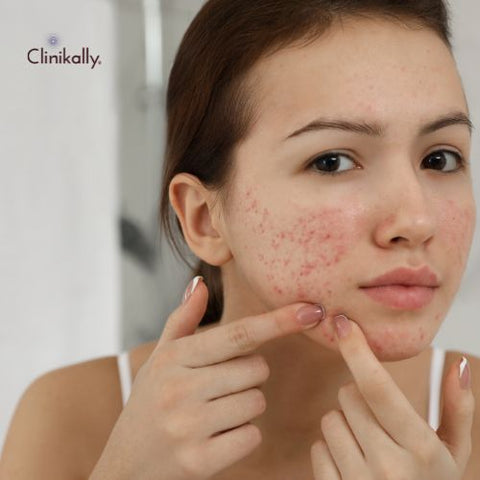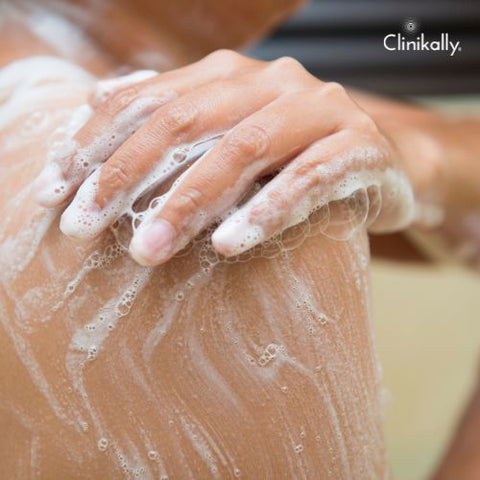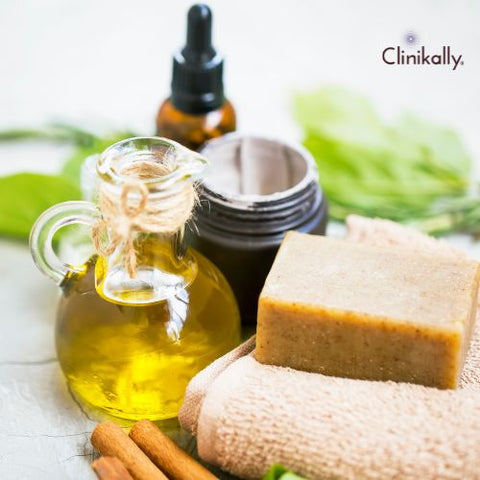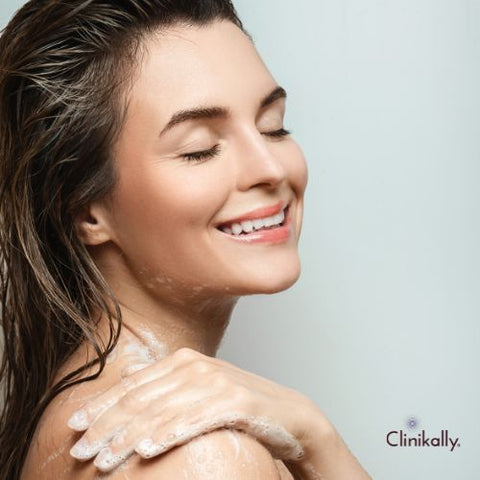Body washes for acne are a common remedy for treating acne on the shoulders, back, and chest. These body washes' active components, such as salicylic acid, benzoyl peroxide, or glycolic acid, can assist in clearing clogged pores and reducing inflammation. But with so many choices, it can be difficult to select the one that is best for you. When selecting a body wash for acne, keep the following things in mind:
-
Skin Type: When choosing a body wash for acne, take into account your skin type. If you have dry or sensitive skin, you may want to look for a body wash that contains moisturizing ingredients such as aloe vera or glycerin. However, if you have oily skin, you might want to choose a body wash with salicylic acid or benzoyl peroxide to help control the overproduction of oil.
-
Active Ingredients: Seek out a body wash for acne that contains active ingredients like salicylic acid, benzoyl peroxide, or glycolic acid. These components help exfoliate the skin, clear clogged pores and lessen inflammation. Salicylic acid can penetrate deep into pores to remove excess oil and dead skin cells, making it particularly effective for treating body acne.
-
Active Ingredient Concentration: Verify the body wash's active ingredient concentration. The skin may become more irritated when active ingredients are present in higher concentrations, which may make them more effective. If more concentration is required, start with less and add it gradually.
-
Additional Ingredients: Consider any additional ingredients in the body wash, such as moisturizers, vitamins, or natural extracts. These ingredients can aid in calming and nourishing the skin, but some people may experience itchiness or allergic reactions to them.
-
Brand Reputation: Look for a reputable brand that specializes in acne treatment. To learn more about other customers' opinions of the product, read reviews.
Always use an acne body wash in conjunction with other acne-fighting products and a good skincare routine, even though it can be an effective tool for treating body acne. Consult a dermatologist for a more thorough evaluation and possible treatment options if your acne is severe or does not get better with over-the-counter remedies.
Understanding Acne

Acne is a common skin condition that develops when oil and dead skin cells clog hair follicles. This leads to the formation of whiteheads, blackheads, pimples, and sometimes deeper, painful cysts or nodules. Acne can occur anywhere on the body, but it is most commonly found on the face, chest, and back. Numerous factors, such as hormonal changes, genetics, stress, diet, and specific medications, can contribute to acne. Although it can happen at any age, adolescence is when it happens the most frequently. The severity of acne will determine how it is treated. Frequently, over-the-counter medications containing salicylic acid or benzoyl peroxide can treat mild acne. Prescription medications like antibiotics, retinoids, or hormonal therapy might be necessary for acne that is more severe. In some circumstances, treatments like chemical peels or light therapy might be suggested. It's crucial to refrain from picking or squeezing acne lesions, as doing so can cause scarring and additional inflammation. Aside from treating acne, good skin care techniques like moisturizing, protecting yourself from the sun, and cleansing gently can also help.
What Causes Acne?
Acne is a common skin condition that develops when oil and dead skin cells clog hair follicles. Some of the root causes of acne include:
-
Hormonal changes: Hormonal changes during puberty, pregnancy, menstruation, and menopause can cause acne.
-
Excessive oil production: The skin's sebaceous glands produce an excessive amount of oil, which can clog pores.
-
Bacteria: The bacteria Propionibacterium acnes, which is naturally present on the skin, can multiply and cause inflammation and acne.
-
Genetics: Acne can be hereditary and run in families.
-
Certain medications: Some medications, such as corticosteroids, can cause acne as a side effect.
-
Diet: Some studies suggest that a diet high in refined carbohydrates, dairy, and saturated and trans fats may contribute to acne.
-
Stress: Stress can cause acne by increasing oil production and inflammation in the skin.
Different Types of Acne
There are several types of acne that can appear on the skin. The most common types include:
-
Whiteheads: These are small, white bumps on the skin caused by clogged pores.
-
Blackheads: These are similar to whiteheads, but the pores are open and exposed to air, giving them a dark appearance.
-
Papules: These are small, red bumps on the skin that can be painful to touch.
-
Pustules: These are similar to papules but are filled with pus.
-
Nodules: These are large, painful bumps that form beneath the skin and can take a long time to heal.
-
Cysts: These are deep, painful, and pus-filled bumps that can cause scarring.
Acne is also classified as mild, moderate, or severe depending on the number of lesions and the degree of inflammation.
Choosing the Right Body Wash for Acne

There are a few things to consider when selecting a body wash for acne-prone skin:
-
Look for "non-comedogenic" products: Non-comedogenic products are designed to avoid clogging pores, which can lead to acne breakouts.
-
Consider the following ingredients: salicylic acid or benzoyl peroxide: These ingredients are well-known for their ability to treat and prevent acne by unclogging pores and reducing inflammation.
-
Avoid using harsh or fragranced body washes: Harsh or fragranced body washes can strip the skin's natural oils, causing dryness and irritation, which can aggravate acne.
-
Opt for a gentle, hydrating body wash: Look for a gentle and hydrating body wash that can help soothe and nourish acne-prone skin.
-
Consider your skin type: If you have dry or sensitive skin, you should use a body wash designed specifically for these skin types, as acne treatments can be drying or irritating.
It's also a good idea to talk to your dermatologist about which body wash is best for your specific skin concerns and needs.
Ingredients to Look For
When looking for a body wash to treat acne, look for the following ingredients:
-
Salicylic acid: This beta-hydroxy acid aids in the unclogging of pores and the exfoliation of dead skin cells. It works especially well for treating body acne.
-
Benzoyl peroxide: This ingredient kills acne-causing bacteria and aids in the prevention of future breakouts. It can be drying, so use it sparingly.
-
Tea tree oil: This natural ingredient contains antibacterial properties that can aid in the treatment of acne.
-
Glycolic acid: This alpha-hydroxy acid can aid in the exfoliation of dead skin cells and the unclogging of pores. It works especially well for treating keratosis pilaris, a condition that causes rough, bumpy skin.
-
Charcoal: This ingredient can aid in the removal of excess oil and impurities from the skin, which can aggravate acne.
-
Sulfur: This ingredient aids in the absorption of excess oil and the exfoliation of dead skin cells. It works especially well for treating body acne.
-
Niacinamide: This form of vitamin B3 can help reduce inflammation and redness associated with acne.
When selecting a body wash, it is critical to carefully read the label and look for these ingredients. Remember that everyone's skin is unique, so what works for one person might not work for another. It's also important to use acne body washes consistently and give them time to work - it can take several weeks to see results.
Ingredients to Avoid
It's important to stay away from certain ingredients in body washes if you are prone to breakouts because they can aggravate acne or irritate the skin. The following ingredients should be avoided:
-
Sodium lauryl sulfate (SLS): This substance can deplete the skin's natural oils, causing dryness, irritation, and even more breakouts.
-
Fragrance: Fragrances can irritate skin and trigger allergic reactions, which can result in breakouts.
-
Alcohol: Alcohol can dry out skin, which increases sensitivity to irritation and acne.
-
Synthetic dyes and colors: These substances can irritate the skin and increase breakouts.
-
Mineral oil: This substance can clog pores and cause acne.
If you have sensitive skin or are prone to acne, it's important to read the ingredient list on body washes and stay away from these ingredients.
Tips for a Better Skincare Routine

Maintaining clear skin and avoiding acne requires a good skincare regimen. Here are some pointers for a more effective skincare regimen:
-
Cleanse: Wash your face once in the morning and once before going to bed each day. Utilize a mild cleanser that is appropriate for your skin type. Hot water should not be used because it can deplete your skin's natural oils.
-
Exfoliate: To get rid of dead skin cells and unclog pores, exfoliate your skin once or twice a week. Use an appropriate gentle exfoliant for your skin type.
-
Moisturize: After cleansing and exfoliating, moisturize your skin. Use a moisturizer that is appropriate for the type of skin you have. If you have oily skin, use a lightweight, oil-free moisturizer. Make use of a thicker, creamier moisturizer if you have dry skin.
-
Protect: Protect your skin from the sun by using sunscreen with at least SPF 30. Even on cloudy days, use sunscreen every day.
-
Avoid touching your face: Touching your face can spread bacteria and oil to your skin, which can lead to acne. When applying skincare products, wash your hands first and refrain from touching your face throughout the day.
-
Use non-comedogenic products: These products are designed to prevent pore clogging. Use non-comedogenic skincare products to prevent acne.
-
Keep hydrated: Water is essential for keeping your body and skin hydrated.
-
Avoid harsh products: Avoid using harsh skincare products that can irritate your skin and cause acne. Use gentle products that are appropriate for your skin type instead.
-
Get enough sleep: Sleeping enough can keep your skin clear and help you avoid breakouts.
-
Consult a dermatologist: If you have persistent acne, consult a dermatologist for professional treatment and advice.
Moisturizing the Skin
Moisturizing is an important part of any skincare routine, regardless of skin type. It assists in preventing dryness, flakiness, and other skin problems while keeping the skin hydrated and healthy. When applied to the skin, moisturizers form a barrier that traps moisture while also supplying the skin with healthy ingredients that can enhance both its general health and appearance. It's important to take your skin type and any particular concerns into account when selecting a moisturizer. For instance, you might want to look for a light, oil-free moisturizer that won't clog your pores or cause breakouts if you have oily or acne-prone skin. However, a richer, more emollient moisturizer that can help to restore lost moisture and improve skin texture may be beneficial if you have dry or mature skin.
It's crucial to apply moisturizer correctly in addition to making the right choice. After cleansing it, pat your skin dry with a fresh towel. Then, using upward and outward motions, gently massage your skin with a small amount of moisturizer that has been applied to your fingertips. Particular focus should be given to any dry or abrasive areas, such as your elbows or knees. Use your moisturizer consistently as part of your daily skincare routine to get the most benefit from it. After cleansing, apply it in the morning and evening and reapply as necessary throughout the day. Your skin's hydration, texture, and general health ought to all get better over time.
Exfoliating the Skin
Exfoliating is the procedure used to remove dead skin cells from the skin's surface. This is an essential step in any skincare regimen because it can enhance the tone, texture, and general appearance of the skin. Exfoliating can aid in pore cleaning, which helps to keep acne and other skin blemishes from developing.
Physical and chemical exfoliation are the two main types. In order to physically remove dead skin cells from the skin's surface during physical exfoliation, a scrub or brush is used. To dissolve or loosen dead skin cells, chemical exfoliation uses acids, enzymes, or other chemicals. In order to best address your skin's needs, it's critical to select the appropriate exfoliation method. If you have sensitive skin, for instance, think about using a gentle chemical exfoliant rather than physical exfoliation.
When exfoliating, it's important to use gentle, circular motions to avoid damaging the skin. Exfoliating excessively should also be avoided because it can dry out and irritate the skin. For normal to oily skin types, it is generally advised to exfoliate 1-2 times per week; for sensitive skin types, it is advised to exfoliate once every two weeks. To avoid dryness and flakiness, it's crucial to moisturize the skin after exfoliating. By doing this, further damage or irritation to the skin's natural moisture barrier may be prevented.
Cleansing the Skin
Every skincare routine should include cleansing the skin, especially when treating acne. Cleansing helps remove dirt, oil, and impurities that can clog pores and contribute to breakouts. Here are some pointers for thorough cleaning:
-
Select a gentle cleanser: Look for a cleanser free of abrasive ingredients like sulfates and alcohol that are formulated for your skin type. For skin that is prone to acne, a mild, non-foaming cleanser is usually the best choice.
-
Use lukewarm water: Avoid hot water, which can strip the skin of its natural oils and cause irritation. Use lukewarm water instead to gently cleanse the skin.
-
Wash your face twice a day: Cleansing your face twice a day, once in the morning and once at night, is usually sufficient. Over-cleansing can actually strip the skin of its natural oils and cause more problems.
-
Use your fingertips: Use your fingertips to massage the cleanser into your skin, rather than a washcloth or other abrasive tool. This will help avoid irritation and damage to the skin.
-
Rinse thoroughly: Be sure to rinse your face thoroughly with lukewarm water to remove all traces of the cleanser.
-
Pat dry: After cleansing, gently pat your face dry with a clean towel. Avoid rubbing the skin, as this can cause irritation.
-
Don't forget about other areas: If you experience body acne, be sure to cleanse those areas as well with a gentle body wash.
Keep in mind that cleansing is only one step in a full skincare routine. To keep your skin glowing and healthy, be sure to moisturize and use sunblock.
Natural Ingredients for Acne Treatment

Acne is a common skin condition that affects people of all ages and skin types. Even though there are numerous over-the-counter and prescription treatments for acne, some people favor using natural ingredients. Here are some natural ingredients that are known for their acne-fighting properties:
-
Tea tree oil: This essential oil effectively treats acne thanks to its antibacterial and anti-inflammatory properties. It can be applied topically to the skin or added to a cleanser or toner.
-
Aloe vera: Aloe vera's calming and anti-inflammatory properties can help lessen the inflammation and redness brought on by acne. It can be mixed with a moisturizer or applied topically to the skin.
-
Witch hazel: Due to its astringent qualities, witch hazel can help minimize pore size and stop breakouts. It can be mixed with a toner or applied topically to the skin.
-
Apple cider vinegar: Due to its antimicrobial properties, apple cider vinegar can aid in the battle against acne-causing bacteria. It can be used as a toner or added to a mask.
-
Green tea: Green tea has anti-inflammatory and antioxidant properties that can help reduce inflammation and prevent acne. It can be applied topically to the skin or added to a toner or mask.
-
Honey: Honey has antibacterial and anti-inflammatory properties that can help soothe and heal acne-prone skin. It can be applied topically to the skin or added to a mask.
Although using natural ingredients to treat acne can be successful, it's important to remember that not everyone will experience success and that results may take longer to appear than with conventional acne treatments. To prevent possible allergic reactions, it's also crucial to perform a patch test before using any new ingredients.
Tea Tree Oil
The Australian native plant Melaleuca alternifolia yields tea tree oil, an essential oil, from its leaves. It is an effective acne treatment due to its antimicrobial and anti-inflammatory properties. Tea tree oil eliminates the bacteria that cause acne, reduces inflammation, and helps to clear clogged pores. It helps regulate the skin's oil production, which can worsen acne. Tea tree oil can be applied directly to the acne-prone area with a cotton swab or combined with carrier oil, such as jojoba or coconut oil. Tea tree oil should always be diluted before being applied to the skin because using it undiluted can irritate the skin. Numerous acne-treating items, including cleansers, toners, and spot treatments, contain tea tree oil. However, since tea tree oil can be too abrasive for some skin types, it is crucial to select products with a low concentration of the ingredient.
Aloe Vera
Aloe vera is a plant that is widely used in skin care products due to its numerous benefits for the skin. It is effective in treating skin that is prone to acne because it has anti-inflammatory and antimicrobial properties. Enzymes, antioxidants, and vitamins are also present, which can help to calm and hydrate the skin. Applying aloe vera gel directly to the skin can help lessen the irritation, redness, and inflammation brought on by acne. The skin can benefit from being moisturized without feeling greasy. Aloe vera can be applied all over the face as a moisturizer or as a spot treatment for acne. Aloe vera has the ability to treat acne and also has the ability to treat acne scars and blemishes. Aloesin, a substance found in it, has been shown to suppress the synthesis of melanin, which can help to lessen the visibility of dark spots and hyperpigmentation. It's crucial to pick a high-quality aloe vera product that doesn't contain any extra chemicals or preservatives when using the plant to treat acne. Look for aloe vera gel or other products that are made especially for skin that is prone to acne and that are 100% pure aloe vera.
Honey
Honey has been used for centuries as a natural remedy for various health and beauty issues. Its antibacterial and anti-inflammatory qualities make it a popular ingredient in skincare products, including those meant to treat acne. Enzymes found in honey can produce hydrogen peroxide, which can kill acne-causing bacteria. It also has humectant properties, which means it can draw moisture to the skin to keep it hydrated and prevent dryness, which can exacerbate acne.
Honey applied to the skin as a mask or spot treatment can help lessen swelling, redness, and inflammation brought on by acne breakouts. Dead skin cells may also be removed, which may help to clear up clogged pores and give the skin a clearer, smoother appearance. But it's crucial to remember that not all honey is made equally. In comparison to other types of honey, manuka honey, which is made from the nectar of the manuka tree in New Zealand, has been shown to have particularly potent antibacterial properties. Before using honey on the face, it's also important to patch-test it on a small area of skin because some people may be allergic to it. Additionally, honey is sticky and can be challenging to wash off the skin, so it's crucial to use warm water and a mild cleanser to get all of it off.
Get Healthy Skin With Acne Body Washes!

As a result, acne body washes can be helpful in both treating and preventing acne, but it's crucial to pick the right product based on your skin type and the severity of your acne. Avoid harsh ingredients like sulphates and alcohol and seek out body washes with ingredients that fight acne, such as salicylic acid and benzoyl peroxide. It can also be helpful for acne-prone skin to include natural ingredients like tea tree oil, aloe vera, and honey in your skincare regimen. Additionally, maintaining healthy skin and avoiding breakouts can be achieved by adopting good skincare practices like regular cleansing, exfoliating, and moisturizing.









































